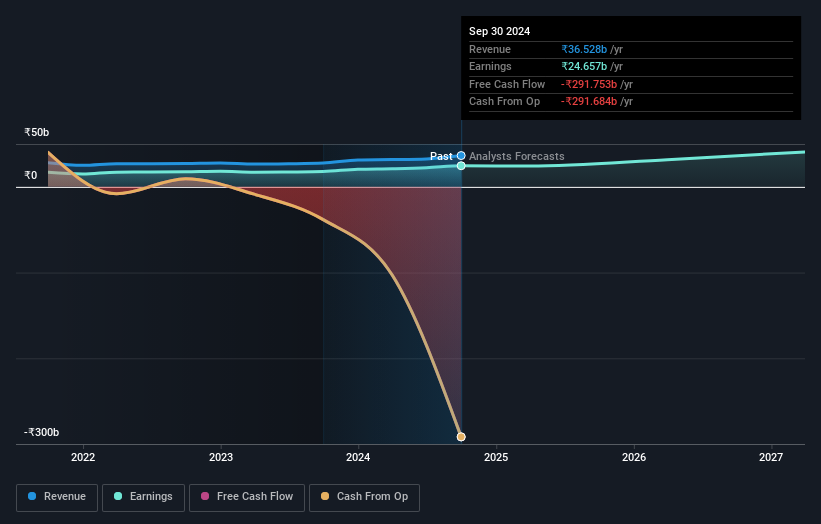- India
- /
- Diversified Financial
- /
- NSEI:HUDCO
Institutions along with state or government who hold considerable shares inHousing and Urban Development Corporation Limited (NSE:HUDCO) come under pressure; lose 13% of holdings value
Key Insights
- Significant control over Housing and Urban Development by state or government implies that the general public has more power to influence management and governance-related decisions
- 54% of the company is held by a single shareholder (India)
- 13% of Housing and Urban Development is held by Institutions
To get a sense of who is truly in control of Housing and Urban Development Corporation Limited (NSE:HUDCO), it is important to understand the ownership structure of the business. The group holding the most number of shares in the company, around 75% to be precise, is state or government. In other words, the group stands to gain the most (or lose the most) from their investment into the company.
While institutions who own 13% came under pressure after market cap dropped to ₹429b last week,state or government took the most losses.
Let's take a closer look to see what the different types of shareholders can tell us about Housing and Urban Development.
See our latest analysis for Housing and Urban Development

What Does The Institutional Ownership Tell Us About Housing and Urban Development?
Institutions typically measure themselves against a benchmark when reporting to their own investors, so they often become more enthusiastic about a stock once it's included in a major index. We would expect most companies to have some institutions on the register, especially if they are growing.
We can see that Housing and Urban Development does have institutional investors; and they hold a good portion of the company's stock. This implies the analysts working for those institutions have looked at the stock and they like it. But just like anyone else, they could be wrong. If multiple institutions change their view on a stock at the same time, you could see the share price drop fast. It's therefore worth looking at Housing and Urban Development's earnings history below. Of course, the future is what really matters.

Housing and Urban Development is not owned by hedge funds. India is currently the company's largest shareholder with 54% of shares outstanding. This essentially means that they have extensive influence, if not outright control, over the future of the corporation. For context, the second largest shareholder holds about 21% of the shares outstanding, followed by an ownership of 7.9% by the third-largest shareholder.
While it makes sense to study institutional ownership data for a company, it also makes sense to study analyst sentiments to know which way the wind is blowing. There is some analyst coverage of the stock, but it could still become more well known, with time.
Insider Ownership Of Housing and Urban Development
While the precise definition of an insider can be subjective, almost everyone considers board members to be insiders. Management ultimately answers to the board. However, it is not uncommon for managers to be executive board members, especially if they are a founder or the CEO.
I generally consider insider ownership to be a good thing. However, on some occasions it makes it more difficult for other shareholders to hold the board accountable for decisions.
We note our data does not show any board members holding shares, personally. Given we are not picking up on insider ownership, we may have missing data. Therefore, it would be interesting to assess the CEO compensation and tenure, here.
General Public Ownership
The general public-- including retail investors -- own 12% stake in the company, and hence can't easily be ignored. While this group can't necessarily call the shots, it can certainly have a real influence on how the company is run.
Next Steps:
While it is well worth considering the different groups that own a company, there are other factors that are even more important. Be aware that Housing and Urban Development is showing 3 warning signs in our investment analysis , and 2 of those are significant...
Ultimately the future is most important. You can access this free report on analyst forecasts for the company.
NB: Figures in this article are calculated using data from the last twelve months, which refer to the 12-month period ending on the last date of the month the financial statement is dated. This may not be consistent with full year annual report figures.
Valuation is complex, but we're here to simplify it.
Discover if Housing and Urban Development might be undervalued or overvalued with our detailed analysis, featuring fair value estimates, potential risks, dividends, insider trades, and its financial condition.
Access Free AnalysisHave feedback on this article? Concerned about the content? Get in touch with us directly. Alternatively, email editorial-team (at) simplywallst.com.
This article by Simply Wall St is general in nature. We provide commentary based on historical data and analyst forecasts only using an unbiased methodology and our articles are not intended to be financial advice. It does not constitute a recommendation to buy or sell any stock, and does not take account of your objectives, or your financial situation. We aim to bring you long-term focused analysis driven by fundamental data. Note that our analysis may not factor in the latest price-sensitive company announcements or qualitative material. Simply Wall St has no position in any stocks mentioned.
About NSEI:HUDCO
Housing and Urban Development
Provides loans and financing for housing and urban development projects in India.
High growth potential with proven track record.
Similar Companies
Market Insights
Community Narratives




